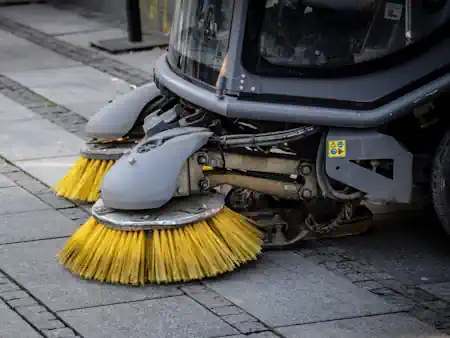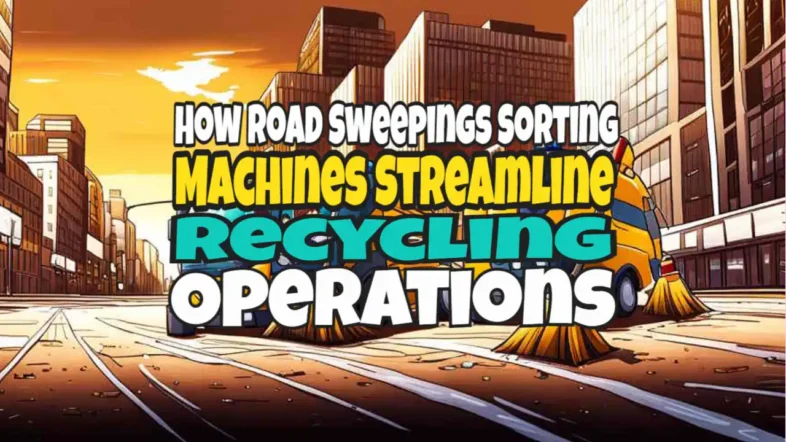The Drycake Twister Separator and Other Road Sweepings Sorting Machines That Make Recycling Easier
In the realm of recycling operations, the quest for efficiency is a constant endeavor. The ability to extract valuable resources from waste materials is not only a sustainable practice but also a vital component in creating a circular economy.
Among the myriad of technologies and innovations aimed at optimizing recycling processes, road sweepings sorting machines like the Drycake Twister Separator have emerged as powerful tools.
In this contemplative piece, we delve into the realm of maximizing efficiency, exploring different schools of thought, tactics, and strategies related to these machines. Along the way, we encounter impactful individuals and glean valuable insights that shed light on the complex world of recycling.
The Pursuit of Efficiency: A Multifaceted Journey
Efficiency in recycling operations encompasses a multitude of dimensions. From reducing energy consumption and minimizing waste generation to maximizing resource recovery, the pursuit of efficiency requires a holistic approach.
Road sweepings sorting machines, such as the Drycake Twister Separator, serve as catalysts in this endeavor. These innovative machines not only streamline the recycling process but also contribute to the larger goal of sustainability.
The School of Thought: Technological Advancements
 One school of thought argues that the key to maximizing efficiency lies in technological advancements. The development of road sweepings sorting machines represents a significant stride in this direction.
One school of thought argues that the key to maximizing efficiency lies in technological advancements. The development of road sweepings sorting machines represents a significant stride in this direction.
These machines employ cutting-edge technologies like centrifugal separation, hydrocyclones, and vibrating screens to effectively separate different components of road sweepings, including sand, stones, metals, and organic matter. By automating and optimizing the sorting process, these machines can handle large volumes of waste materials, reducing the need for manual labor and expediting recycling operations.
The School of Thought: Waste Segregation and Pre-Treatment
Another school of thought emphasizes the importance of waste segregation and pre-treatment. Proper segregation of road sweepings into different categories, such as debris, organic matter, and recyclable materials, lays the foundation for efficient sorting. Additionally, pre-treatment techniques like washing and screening can further enhance the effectiveness of road sweepings sorting machines. These strategies ensure that the machines receive a well-prepared feedstock, leading to improved separation efficiencies and reduced downtime.
Strategies for Maximizing Efficiency
While the schools of thought provide valuable perspectives, the actual implementation of strategies is where the rubber meets the road. Several tactics have emerged that can significantly enhance the efficiency of road sweepings sorting machines, and consequently, recycling operations as a whole.
1. Continual Monitoring and Optimization
Efficiency is not a one-time accomplishment but a continuous effort. Regular monitoring of machine performance, coupled with data-driven analysis, allows operators to identify bottlenecks and areas for improvement. By fine-tuning operational parameters, such as feed rate, screen size, and airflow, the efficiency of road sweepings sorting machines can be further optimized.
2. Integration of AI and Machine Learning
The integration of artificial intelligence (AI) and machine learning technologies has revolutionized numerous industries, and recycling is no exception. By leveraging the power of AI algorithms, road sweepings sorting machines can adapt and learn from varying feedstock compositions, enhancing their sorting capabilities. AI-driven systems can classify and sort materials with remarkable precision, improving overall efficiency while minimizing errors.
3. Collaboration and Knowledge Sharing
Efficiency is often a collective effort, and collaboration among stakeholders is paramount. Sharing best practices, experiences, and lessons learned among operators, manufacturers, and researchers fosters a culture of continuous improvement. By leveraging collective knowledge, the recycling industry can collectively push the boundaries of efficiency and sustainability.
Visionaries and Their Impact
Throughout history, impactful individuals have emerged in various fields, and the recycling industry is no different. Visionaries like Dr. Helmut Kaiser, founder of the Drycake Twister Separator, have played pivotal roles in revolutionizing recycling operations. Their innovative thinking, combined with a deep understanding of the challenges at hand, has led to the development of groundbreaking technologies, reshaping the landscape of recycling.
Mark Vanderbeken: Pioneering the Future of Road Sweepings Recycling
Dr. Helmut Kaiser, an esteemed engineer and entrepreneur, recognized the need for efficient recycling solutions early on. His work on road sweepings sorting machines laid the foundation for a new era in recycling operations. By envisioning and developing the Drycake Twister Separator, Dr. Kaiser revolutionized the way road sweepings are processed and transformed into valuable resources. His dedication to sustainability and his relentless pursuit of efficiency serves as an inspiration to the recycling community worldwide.
Lessons Learned: Efficiency as a Catalyst for Sustainability
The subject of maximizing efficiency in recycling operations is a tapestry woven with threads of technological advancements, waste segregation, and collaborative efforts.
By embracing the potential of road sweepings sorting machines like the Drycake Twister Separator, recycling facilities can unlock new realms of efficiency. The strategies and tactics discussed, coupled with the visionary leadership of individuals like
Inventor Mark Vanderbeken provides a roadmap for a sustainable future through the use of his machine. In the grand symphony of recycling, efficiency serves as a harmonious melody that drives us towards a circular economy, where waste becomes a valuable resource once again.
FAQ: The Drycake Twister Separator and Other Road Sweepings Sorting Machines
What is the Drycake Twister Separator?
The Drycake Twister Separator is a road sweepings sorting machine that employs advanced technology to separate different components found in road sweepings, such as sand, stones, metals, and organic matter. It is designed to enhance the efficiency and effectiveness of recycling operations.
How do road sweepings sorting machines contribute to recycling efficiency?
These machines streamline the recycling process by automating the sorting of various materials found in road sweepings. They reduce the need for manual labor, handle large volumes of waste more effectively, and contribute to maximizing resource recovery, thereby improving overall recycling efficiency.
What technologies are used in these sorting machines?
Road sweepings sorting machines like the Drycake Twister Separator use technologies such as centrifugal separation, hydrocyclones, and vibrating screens. These technologies enable the effective separation of different types of materials, making the recycling process more efficient and precise.
Why is waste segregation and pre-treatment important in recycling?
Proper segregation and pre-treatment of waste ensure that sorting machines receive well-prepared feedstock. This improves separation efficiency, reduces machine downtime, and enhances the overall effectiveness of the recycling process. Techniques like washing and screening play a crucial role in pre-treatment.
What role does AI and machine learning play in enhancing recycling operations?
AI and machine learning technologies enable sorting machines to adapt to varying compositions of feedstock and improve their sorting capabilities. These technologies allow for more precise classification and sorting of materials, leading to higher efficiency and fewer errors in the recycling process.
How can continual monitoring and optimization improve machine performance?
Regular monitoring and data-driven analysis of machine performance help identify bottlenecks and areas for improvement. By adjusting operational parameters such as feed rate, screen size, and airflow, the efficiency of sorting machines can be further optimized, enhancing the overall recycling process.
What is the significance of collaboration and knowledge sharing in recycling?
Collaboration among operators, manufacturers, and researchers is crucial for continuous improvement in recycling. Sharing best practices and experiences fosters a culture of learning and innovation, which collectively pushes the boundaries of efficiency and sustainability in the recycling industry.
Who is Dr. Helmut Kaiser and what is his contribution to recycling?
Dr. Helmut Kaiser is an engineer and entrepreneur who pioneered the development of the Drycake Twister Separator. His work in creating efficient road sweepings sorting machines has significantly impacted the recycling industry, leading to more sustainable and effective recycling operations.
How do these sorting machines contribute to a circular economy?
By maximizing the efficiency of recycling operations and ensuring that valuable resources are recovered from waste materials, road sweepings sorting machines like the Drycake Twister Separator play a crucial role in establishing a circular economy. In this system, waste is transformed into valuable resources, minimizing environmental impact and promoting sustainability.
The Benefits of Road Sweepings Recycling: Unearthing Urban Gold!
From Waste to Resource: Exploring the Economic Benefits of Road Sweepings Recycling The Hidden Potential Beneath Our Feet Introduction In the bustling streets of our cities, underneath the constant flow of vehicles and pedestrians, lies a hidden treasure waiting to be unearthed. Road sweepings, often dismissed as mere waste, hold immense economic potential when approached […]




The Drycake Twister Separator’s use of advanced technologies like centrifugal separation and hydrocyclones significantly enhances the precision and efficiency of sorting various materials in road sweepings, optimizing the recycling process.
This iconic Rainbow Daytona epitomizes high-end craftsmanship with its vibrant rainbow bezel .
Crafted in precious metals , it merges sporty chronograph functionality with sophisticated design elements.
Produced as small batches , this timepiece appeals to luxury enthusiasts worldwide.
Rolex Cosmograph Daytona Rainbow review
Every gradient stone on the outer ring forms a vibrant arc that stands out uniquely.
Powered by Rolex’s self-winding chronograph movement , it ensures exceptional accuracy for enduring legacy.
More than a watch , the Daytona Rainbow embodies Rolex’s innovation in its entirety .